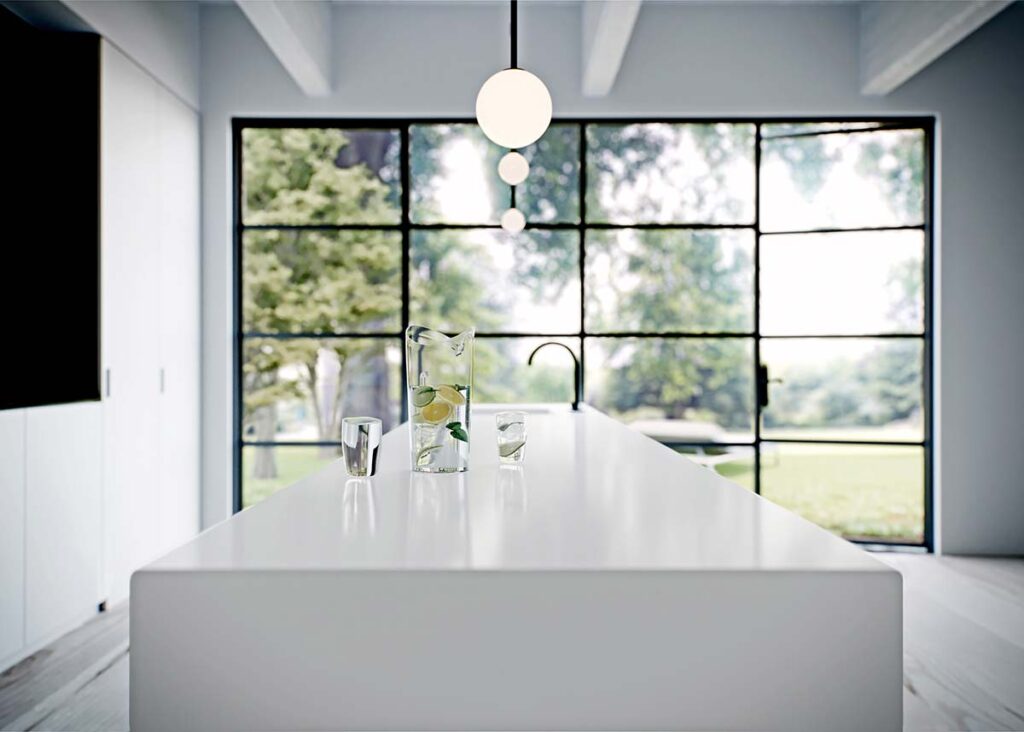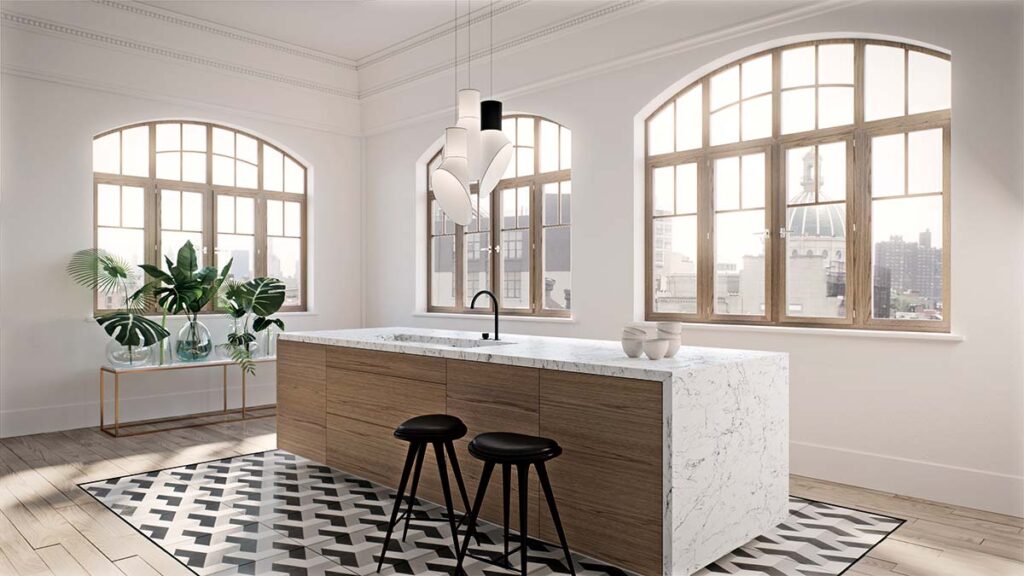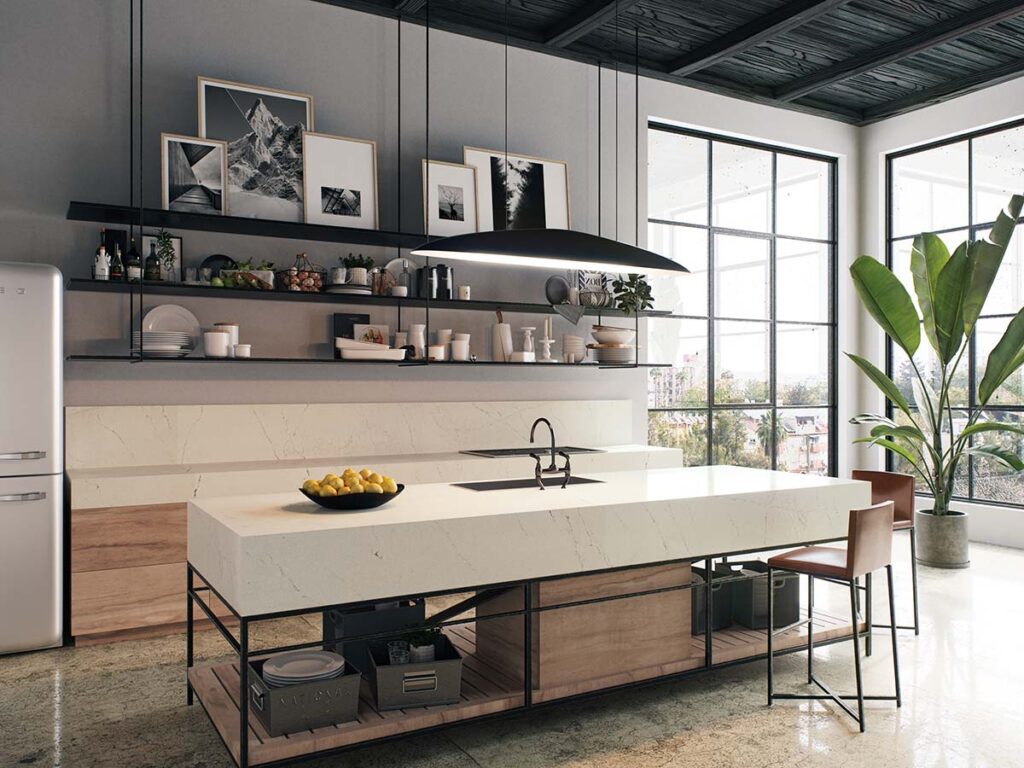Pros and Cons of Stone Coat Countertops
5 min read
Making a decision about which kind of countertop to use in a kitchen or bathroom can be a tricky process. There are pros and cons to all types of kitchen and bathroom countertop surfacing, and the final selection of what material to use depends heavily on the preferences of the countertop’s user and the intended use of the countertop.
This guide will cover the pros and cons of stone coat epoxy countertops, a common choice for low-budget renovations and projects with minor design interests and planning.

A stone coat countertop, often referred to as a stone epoxy countertop, is actually an epoxy coating that can be added to a pre-existing countertop that is in need of repair or replacement. Epoxy coat countertops cannot be purchased as a countertop slab; epoxy coat countertops can only be painted onto a pre-existing countertop structure.
An epoxy is typically a very strong glue or coating material that is made from two separate substances that harden when mixed together. Stone coat epoxy for countertops is not any different in terms of how it is made and how it works. Stone coat epoxy kits typically consist of a resin and a hardener that are packaged separately from one another.
To create a DIY stone coat countertop, the resin and hardener are mixed together, painted on to the existing countertop surface, and left to dry as a hardened coating on top of the countertop.
Choosing to work with an epoxy solution to revamp old countertops instead of purchasing new countertops is certainly a more affordable way to go when it comes to selecting the best design option. In terms of investment, it will last for an amount of time that correlates to its lower cost.
Logistically, it is easier to shop for, transport and bring home the materials necessary for coating an old countertop with an epoxy coat than it is to get a whole new countertop. This, however, does not also mean that the installation process is easier for an epoxy coat as opposed to a new countertop slab.
By choosing to use an epoxy coat to repair or upgrade an old countertop, the countertop remains in place and does not have to be replaced by a new countertop. This does not mean that choosing an epoxy coat instead of a new countertop slab is a better option; it simply means that the old countertop will remain in place.

The cost to value analysis for using an epoxy coat on an old countertop compared to purchasing a new countertop slab is poor. Epoxy coatings are not comparable to high-quality stone countertop slabs in terms of how long they will last.
Obviously, going with an epoxy coat instead of purchasing a new countertop slab is the lower-quality option. While this may be ideal as a very short-term fix or for a bathroom or kitchen design that prioritizes cost over aesthetic and quality, typically homeowners or designers looking for safe, durable, sustainable, long-lasting and attractive countertop options will explore the many beautiful and high-quality quartz countertop slabs available to them. For example, the stunning designs included in Caesarstone’s New Whitelight Collection may be a consideration for them.
Choosing a reliable and superior product like one of Caesarstone’s uniquely crafted quartz countertops will result in a longer-lasting, more attractive, top-quality countertop than simply coating an old countertop with stone epoxy.
Epoxy coatings are extremely difficult to install properly. The epoxy solution is very messy and is quite tricky to work with. It can be nearly impossible to get an epoxy coating that looks good when doing it as a DIY project. Many layers must be painted on to achieve even a partially-acceptable outcome. It is very easy to make huge, unsightly mistakes with epoxy coating, especially for users who are not already familiar with the material.
As stated above, epoxy coatings are very messy and are likely to ruin floors, tiles, appliances, furnishings, and anything else near the DIY epoxy coating work area.
Epoxy coatings do not last very long and will need continual upkeep over time. Additionally, since the epoxy coating is likely to be installed over a damaged, worn out, or otherwise unfit-for-use slab of countertop material (whether it be wood, particle board or another low-quality countertop material), careful attention will need to be paid to the material underneath the epoxy coating to ensure it does not degrade further.
Aesthetically, an epoxy coated countertop will not have the same appeal that a genuine stone countertop will. Even though epoxy countertops can be customized in their design somewhat, the installation process is so tricky that it is rare for an epoxy coat design to turn out looking the way it was intended. Additionally, epoxy coated countertops will stain and are susceptible to scratching, unlike Caesarstone quartz countertops, which will not stain or scratch and will last for a lifetime.

Unless a project is severely restricted by budget or prioritizes budget over design and quality, avoiding epoxy stone coatings for old countertops is usually the best decision to make. Investing in an heirloom kitchen or bath countertop that will hold its value and look brilliant in the space long-term will be a choice that stands the test of time.
The frustrating process of attempting a DIY epoxy coat on an old countertop is sure to lead to headaches and unnecessary stress. Choosing the simpler and higher-quality option of bringing a striking new quartz countertop into a kitchen or bathroom to replace an old countertop is clearly a choice that will be appreciated and enjoyed for years to come.
{{ subtitle }}
{{ i.desc }}
{{ subtitle }}
{{ subtitle }}